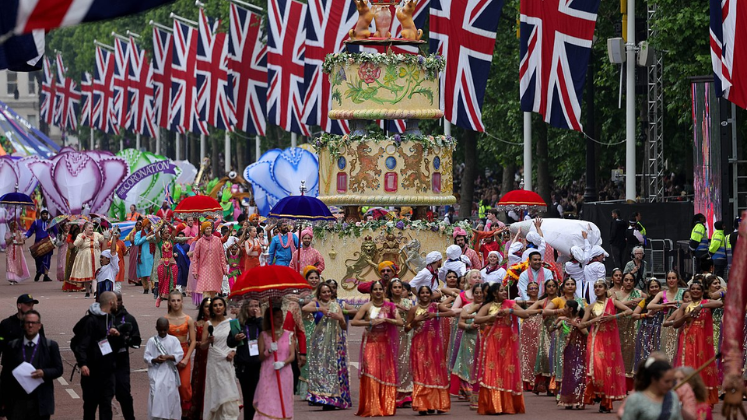In this coronation service, for the first time, some of the regalia will be presented by Peers who belong to different faith traditions, the King will receive a greeting delivered in unison by Representatives from five other faiths, and Jewish, Sunni and Shia Muslim, Sikh, Buddhist, Hindu, Jain, Bahá’í, and Zoroastrian representatives will play a part in the procession. The Archbishop of Canterbury will also commit the Church of England to fostering an environment where “people of all faiths and beliefs may live freely”. In this blog, Rosalind Ward looks at the new King’s role as “defender of the faith”.

According to the BBC, the funeral of Queen Elizabeth II in 2022 was watched in the UK alone by over 28 million viewers and many more across the globe. Whilst viewer numbers for King Charles III’s coronation on the 6th May 2023 are harder to predict, their eventual abundance or deficit could be seen as representative of the monarchy’s ongoing relevance to an increasingly diverse society.
During his coronation, King Charles III will be referred to as the “defender of the faith” by the Archbishop of Canterbury, Justin Welby, and he will promise to uphold Church of England doctrines. Whilst in the past this may have been representative of the majority faith in the UK, in the 2021 census, less than half of the UK population identified as Christian. Is it consequently still possible for the British sovereign to combine his role as “defender of the faith” and monarch of such a diverse population?
Coronations have been held in Westminster Abbey in central London since 1066. The ceremony, written and led by the Archbishop of Canterbury, is a Christian service in the Church of England tradition. In this service there will be readings from the bible, Christian prayers and the sharing of communion, a sacrament practiced by Christians to remember and attest to their belief in Jesus’ crucifixion and resurrection. Furthermore, King Charles will be asked to promise not only that he is a Protestant but that he will uphold the Protestant Reformed Religion and the Church of England as the state religion. The Archbishop of Canterbury will also swear allegiance to the King who is considered the Supreme Governor of the Church of England.
This constitutional role of the monarch in the Church of England dates back to the Reformation during the rule of King Henry VIII. In the Act of Supremacy of 1534, King Henry VIII became head of the Church of England. By breaking from the Pope’s rule, King Henry VIII was thereby able to divorce Catherine of Aragon and marry Anne Boleyn instead.
King Charles III has always shown an interest in other faiths and traditions and has often actively promoted interfaith dialogue. He has not only regularly met with leaders from other faiths and religions but has used his charity, The Prince’s Trust, to encourage dialogue and interfaith participation amongst young people. His visit to Doha in 2014 included meeting local Christian and Muslim leaders and academics in a discussion facilitated by Professor Al-Naimi (Chairman of Doha International Centre for Interfaith Dialogue). He also visited Egypt and Jordan in 2021. During his visit to Egypt, the then Prince Charles participated in interfaith discussions with the Grand Imam, Sheikh Ahmed El-Tayeb and the Archbishop of Alexandria, Dr Samy Fawzy.
Another clear indicator of the King’s respect for and desire to include other faith traditions can be observed in the order of service for the coronation. The entry procession will begin with a procession of leaders from a range of faith traditions including from Judaism, Islam, Sikhism, Hinduism, and many more. The service will also end with a greeting from these faith leaders thus bookending the coronation with symbols of interfaith dialogue and cooperation.
However, these accommodations and steps towards a more inclusive service need to be seen against the background of the constitutional position of the monarch. During the coronation King Charles III promises to work for a society in which those from all faith traditions are allowed to live freely. Nevertheless he also promises to seek to maintain the established Church of England in the legally binding coronation oath. The symbols of his coronation and reign include the Sovereign’s orb with a cross on the top, being anointed with holy oil consecrated at the Church of the Holy Sepulchre in Jerusalem, and proximity to the High Altar during the service, all indicative of the religious nature of the coronation.
The legal nature of the King’s oath to maintain the Church of England and the religious symbolism and setting of the coronation service highlight that the role of the monarch was and continues to be rooted in the established church as the “defender of the faith”. The King’s history and changes made to his coronation service underline his desire and intention to respect those of other faiths and beliefs and to promote their role in British society. However, it is only with constitutional and legal change that the Monarch could ultimately move beyond their designated role as head of the Church of England and reflect an increasingly diverse population.
Image depicts the Platinum Jubilee Parade 2022 – Andrew Parsons / No 10 Downing Street





